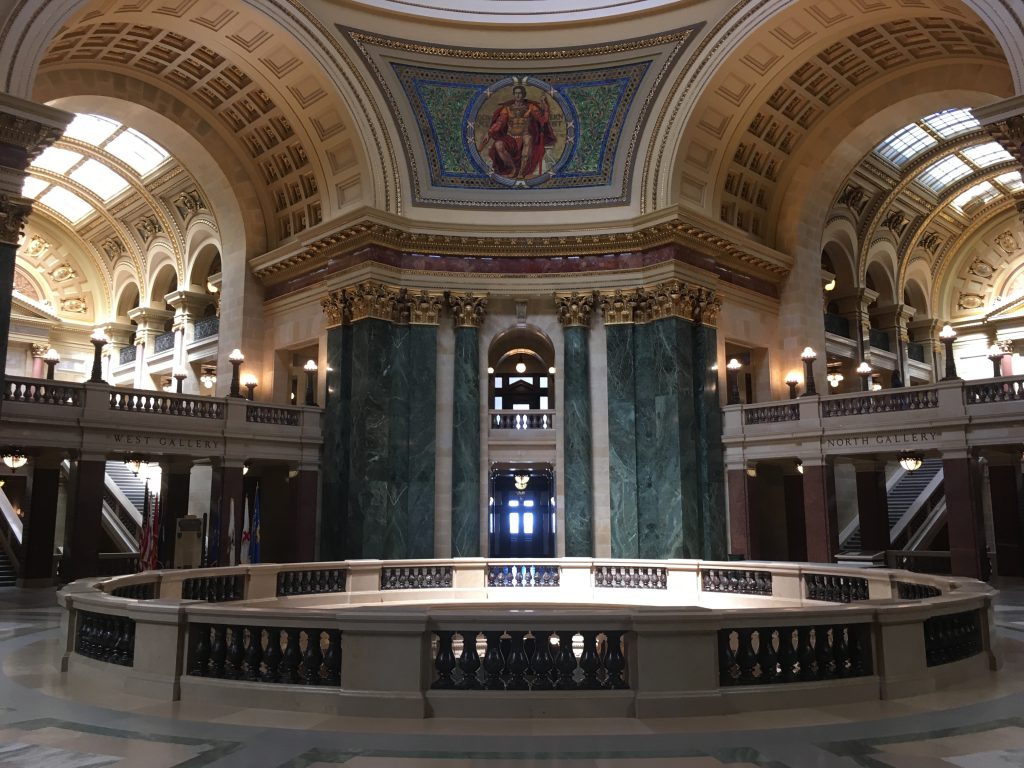Bill To End State Income Tax Debated
Republican and research center push it. Democrat and LFB report raise doubts.
One bright shining object spinning in the Capitol is a bill — sponsored by Republican Sen. Roger Roth — to phase out the individual income tax, which is scheduled to bring in $9.6 billion next year to help pay for schools, health care, prisons, the UW System and lower property taxes on homes.
The idea of eliminating the income tax, and making up some of those lost tax funds by raising the state sales tax from 5% to 8%, originated with a December report by the UW’s Center for Research on the Wisconsin Economy (CROWE). “Tax reform is strongly pro-growth [and] leads to 7.9% higher output and 6.9% higher employment in the long run,” CROWE said.
But a new report by the nonpartisan Legislative Fiscal Bureau (LFB), requested by Democratic Sen. Jon Erpenbach, says state law requires a two-thirds vote of the Legislature, or passage of a statewide referendum, to raise the 5% state sales tax.
Because neither of those will happen, Roth’s bill would only phase out the income tax, if future tax collections exceed estimates. “When the economy was doing well, when money was coming into the state, we would take that and have more or less automatic tax cuts going back to the people until that income tax is eliminated,” Roth said.
But Erpenbach noted that Roth just announced that he is running for lieutenant governor. The Republican’s plan is “nothing more than, ‘Hey, I’m running for lieutenant governor, so look at me’,” Erpenbach said.
A member of the Legislature’s budget committee, Erpenbach called raising Wisconsin’s sales tax “not necessarily a fair way to go about life.”
In 1911, Wisconsin was the first state to adopt a personal income tax (and the federal government didn’t enact one until 1913) based on the premise that high-earning residents should pay more for public services.
Roth’s call to phase out the personal income tax came after LFB estimated the state government’s mid-2023 surplus at $3.8 billion.
Democratic Gov. Tony Evers wants to spend more than $800 million of that on $150 checks for every resident. Republican legislative leaders vow to wait until 2023, after November elections for governor and the Legislature, to decide how to spend the surplus.
Erpenbach asked LFB to analyze CROWE’s report, which assumed the personal income tax would be ended, and the sales tax raised to 8%, on July 1, 2023. LFB’s conclusions:
-Income tax collections would fall by $9.1 billion, which would threaten future state spending on aid to K-12 schools, health care, the UW System, prisons and local governments and for tax credits that lower property taxes.
-Not all income tax filers would be helped by eliminating the income tax, since 72% of them pay income taxes and 28% owe no income taxes because of low earnings or tax credits that wipe out their liability.
-The wealthiest taxpayers would be helped most, if the income tax was eliminated. Specifically, LFB estimated, 40% of taxpayers with the highest incomes would keep more than 90% of what state government would no longer collect in income taxes.
-Individuals pay an estimated 67% of the sales tax, and businesses 33%. So, an 8% state sales tax could cost consumers $2.7 billion more and businesses $1.4 billion more.
-An 8% sales tax would make Wisconsin’s sales tax the highest in the nation. It could also invite residents along the state’s borders to make major purchases in other states.
-Making up a potential annual net loss of $5.1 billion in tax collections, if the income tax was eliminated and replaced by a sales tax increase, would require a 12.1% Wisconsin sales tax.
-State government could have to return some of the billions of dollars received under the federal American Recovery Plan Act, which says no state can use that money to cut its taxes.
“We’re not Florida,” where tourists’ spending allows state government to run without an income tax, Erpenbach said. Tourists spend $96.5 billion a year in Florida; Wisconsin tourists spent $22.2 billion in 2019. Florida has an average state and local sales tax rate of 7%.
Steven Walters started covering the Capitol in 1988. Contact him at stevenscotwalters@gmail.com
If you think stories like this are important, become a member of Urban Milwaukee and help support real, independent journalism. Plus you get some cool added benefits.
The State of Politics
-
A Wisconsin Political Trivia Quiz
 Dec 15th, 2025 by Steven Walters
Dec 15th, 2025 by Steven Walters
-
The Fight Over Wisconsin’s House Districts
 Dec 8th, 2025 by Steven Walters
Dec 8th, 2025 by Steven Walters
-
The Battle Over On-Line Betting
 Nov 24th, 2025 by Steven Walters
Nov 24th, 2025 by Steven Walters






















